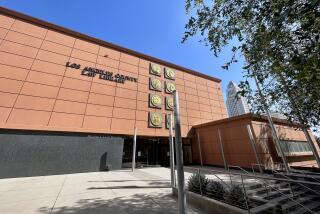Topics : LAW : Center to Offer Resolution Options to a Suit-Happy Society
- Share via
TV shows such as “L.A. Law” have made it clear that people will sue other people for just about any reason.
Warren E. Burger, retired chief justice of the United States, has complained that the American system of dueling litigants is “too costly, too painful, too destructive, too inefficient for a truly civilized people.”
Now comes Judge Dorothy W. Nelson, one of the leaders of a new legal research center that seeks to banish the “I sue you, you sue me” blues burdening U.S. courts.
Nelson, former dean of the USC Law School and now on the U.S. 9th Circuit Court of Appeals in Pasadena, heads the board of the Western Justice Center, perched on a commanding site above the Arroyo Seco.
After 10 years of planning, the nonprofit center opens this week in a refurbished historic bungalow next to the federal courthouse.
The center, which will study and devise ways to resolve conflicts without lawsuits, is starting out with two projects.
In one, the center will work with the Southern California Assn. of Governments to develop ways to resolve differences between governmental agencies. “State and local governments spend millions suing each other,” Nelson said. “One water district sues another water district. It goes on and on.”
The other project, using the basic approach for solving legal logjams, will train students at 21 schools in Santa Monica, Pasadena and South-Central Los Angeles in ways to settle conflicts without violence.
“There is a lot of mediation today,” Nelson said. “Some of it’s good. Some isn’t. Our purpose is to evaluate what’s going on and to encourage experiments and prescribe models.”
The center, funded in part through gifts from Southern California law firms, is the first of its kind west of the Mississippi and is expected to attract scholars from around the world.
Part of the center’s work will be to train those in the legal community to prevent cases from becoming full-blown lawsuits.
“When I first started teaching dispute resolution in 1957, it was considered ‘that woman’s thing,’ the softer form of resolving conflict,” Nelson said. “Now it’s the hottest topic in the justice system.”
More to Read
Sign up for Essential California
The most important California stories and recommendations in your inbox every morning.
You may occasionally receive promotional content from the Los Angeles Times.













